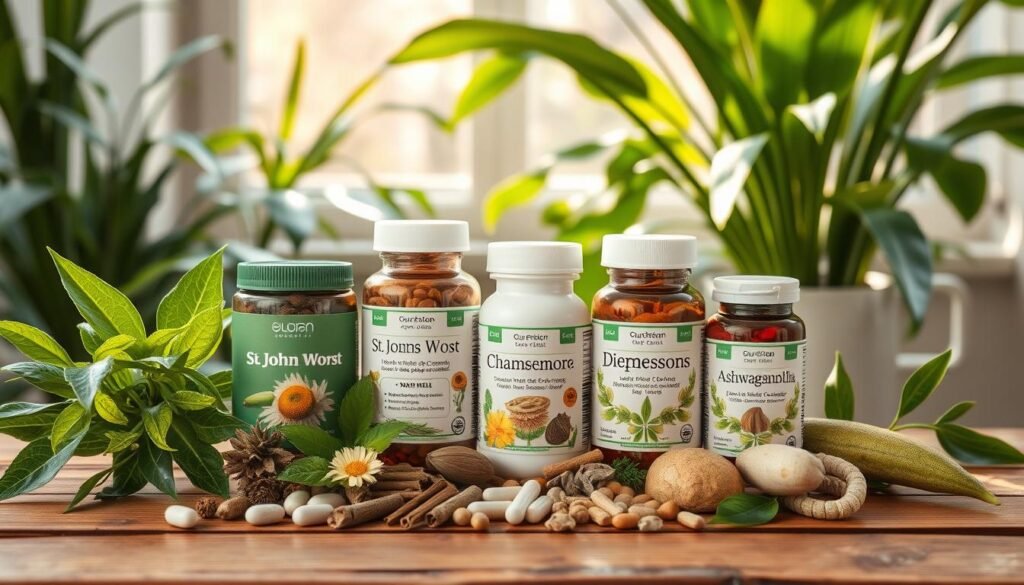About 40% of adults with depression explore other healing ways, often not telling their doctors. This shows a big gap in our talks about how to treat depression effectively. While usual treatments like antidepressants help up to 50% of people, many still need other options. Alternative treatments, from being mindful to using new methods like Transcranial Magnetic Stimulation, show hope for those not helped enough by common treatments. This article looks at natural ways and whole-person therapies for depression. They aim to improve well-being and offer new ways to deal with depression signs.
Key Takeaways
- Around 40% of adults explore complementary and alternative medicine for depression.
- Only 50% of patients may find effectiveness with traditional antidepressant treatments.
- Alternative methods, such as exercise and diet, can significantly impact mood improvement.
- Mindfulness and lifestyle changes are vital components of holistic depression therapies.
- Innovative treatments like TMS and ketamine are gaining traction for treatment-resistant depression.
- St John’s wort and omega-3 fatty acids are promising natural remedies for depression.
Understanding Depression and Its Challenges
Depression is a complex condition that impacts people of all ages and backgrounds. It’s marked by persistent sadness, hopelessness, and a loss of interest in once-loved activities. It’s a widespread issue, affecting about one in six Americans in their lifetime.
Clinical depression, a severe form, greatly disrupts daily life. Understanding and recognizing its symptoms is the first step towards treatment.
Depression puts people through many hurdles. The stigma around it can make people feel isolated, as sharing their struggle is hard. Finding the right treatment can also be challenging. Therapies and medications, like SSRIs, help some but not everyone.
Many face side effects or find treatments ineffective. This journey often involves personalized care plans from mental health professionals, says the National Institute of Mental Health.
Dealing with clinical depression is tough. It can lead to suicidal thoughts. Thus, reaching out for help and building a support network is crucial. Treatments like increasing exercise, engaging in cognitive-behavioral therapy, and trying complementary therapies are beneficial.
By acknowledging depression’s complexities, one can treat themselves and others with more kindness. This understanding promotes resilience and hope in overcoming depression.
For more information on depression, visit this resource.
What is Treatment-Resistant Depression?
Treatment-resistant depression is a condition where standard treatments don’t ease depression symptoms. About 29% to 46% of people with major depression don’t get better with first tries. This shows that usual treatments often don’t work well, making managing depression difficult.
Doctors say you have treatment-resistant depression if two different meds didn’t help you. While some get better with meds, 10-15% see no change. Another 30-40% feel only a bit better. The reason might be genetic differences or things like folate levels in the brain.
Finding new ways to treat hard cases is key. Treatments like vagus nerve stimulation and ECT are for tough cases. They are costly and invasive. Meds like modafinil and Adderall might help but results vary.
Doctors are important in finding what treatment is best. They look at your health history and what you’re going through. Looking at many treatments, not just meds, can help. For more info, see this resource.
For those with complex depression, finding the right treatment takes work. Knowing more about the different treatments helps people find the best path to feeling better.
Alternative Depression Treatment Options
Exploring other ways to treat depression can give people more choices. These options focus on therapies and lifestyle changes. They aim to lessen depression’s effects without only using meds.
Overview of Non-Pharmacological Approaches
Non-drug approaches include Cognitive Behavioral Therapy (CBT) and Acceptance and Commitment Therapy (ACT). They help change negative thoughts and improve behavior. Many find these methods help manage depression better.
Complementary Therapies and Their Benefits
Other treatments like yoga, acupuncture, and meditation can also help. They’ve been known to reduce stress and promote calm. While research is still ongoing, many say these treatments really help. Using these methods along with others can help people manage their mental health better.
Mindfulness-Based Depression Interventions
Mindfulness-based techniques help those with depression. They focus on being aware of thoughts and feelings without judgment. This can help control emotions and clear the mind, which is key for managing depression.

Practicing Mindfulness for Mental Clarity
Mindfulness has many mental health benefits. It’s been shown to reduce depression relapse. For example, a 2000 study found those doing mindfulness therapy had a lower relapse rate than those in standard treatment. More research confirms its effectiveness.
A 2015 review showed mindfulness, along with other therapies, cuts depression relapse rates. It’s good when used with other treatments for people with repeated depression.
Mindfulness makes you open and accepting of the now. It helps you stay in the moment instead of worrying about the past or future. It fits well with other therapies like Dialectical Behavioral Therapy.
About 80% of those with major depression might relapse. Mindfulness practices are key in preventing this. They help build resistance to depression through ongoing practice.
| Study Year | Intervention | Relapse Rate | Comparison Group |
|---|---|---|---|
| 2000 | 8-week MBCT | 40% | Treatment as Usual (66%) |
| 2008 | MBCT | 47% | Medication Alone (60%) |
| 2015 | MBCT, CBT, IPT | Significant Reduction | Active & Inactive Controls |
Lifestyle Changes for Depression
Making big changes to your lifestyle can really help with depression. Things like improving your sleep can make a big difference. For good health, adults under 65 need 7-9 hours of sleep. Those older need 7-8 hours. Teens need more, about 8-10 hours, for their bodies and minds.
Eating well is key to feeling better. You should eat fruits, veggies, grains, lean meats, and low-fat dairy. This gives you the nutrients you need. Watching how much you eat is important too. Boosting your intake of magnesium, folic acid, and vitamin B can help keep depression away.
Staying active helps with depression recovery. Try to exercise for 30 minutes most days. It lifts your mood and lessens stress. Also, do things you enjoy. It can make you happier. Splitting big jobs into smaller tasks can give you a sense of achievement.
Don’t forget about managing stress. Mindfulness, meditation, and being social are good for you. Staying connected with people helps fight the loneliness of depression. Yoga and relaxation can also make your emotions stronger.
Looking into holistic depression therapies is a good idea too. Talk to doctors about natural treatments. Things like herbal supplements and journaling can support you. If you have serious depression, it’s important to get professional help, especially if you think about harming yourself.
| Lifestyle Change | Recommendation | Benefits |
|---|---|---|
| Sleep Hygiene | 7-9 hours for adults under 65 | Improved mood, concentration |
| Balanced Diet | Include fruits, vegetables, whole grains | Better nutrition, energy |
| Physical Activity | 30 minutes, 3-5 days a week | Mood enhancement, stress reduction |
| Social Activities | Engage regularly with friends | Combat isolation, emotional support |
| Mindfulness Practices | Incorporate meditation techniques | Reduces stress, enhances resilience |
Exercise for Depression Relief
Physical activity is key to mental health. It is a great way for people to feel better if they’re down. Experts say adults should do 150 minutes of moderate exercise each week. This helps improve mental health by increasing endorphins.
The Role of Physical Activity in Mental Health
Studies link physical activity directly with better mental health. Activities like walking boost mood and ease anxiety. Getting active regularly can also lower depression symptoms and stop them from coming back. It’s a good idea to talk to a doctor before starting new exercises, especially if you have health issues or take medicines.
Specific Exercises Beneficial for Mood Improvement
Some exercises are especially good for feeling happier. Here are a few:
- Walking or jogging: These can help reduce depression a bit.
- Yoga: It’s great for flexibility, clear thinking, and feeling calm.
- Strength training: This can help lessen signs of depression with planned workouts.
- Mixed aerobic exercises: These improve heart health and mood.
- Tai chi or qigong: These mix slow movements with mindfulness to boost overall health.
Choosing exercises that you enjoy and can keep doing is important. Sticking with these activities can bring long-term happiness and health, highlighting the link between being active and feeling good.

Nutritional Approaches to Depression
Eating right plays a big part in managing depression. Studies show eating certain foods and supplements can help improve mental health. It’s key to use nutrition to feel better and stabilize mood.
Foods That Boost Mood and Energy
Eating foods that boost mood can really help with depression. A 2017 study found big improvements in people with serious depression who got dietary advice. Over 32% of them felt a lot better. Important foods include:
- Omega-3 fatty acids: Found in cold-water fish, flaxseed, walnuts, and supplements, these fats can enhance brain function and protect nerve cells.
- Selenium-rich foods: Whole grains, Brazil nuts, seafood, and organ meats may improve mood and reduce anxiety.
- Vitamin D sources: Oily fish, fortified dairy products, beef liver, and eggs can help alleviate depression symptoms.
- Antioxidant-rich plant foods: Berries, soy, and a variety of fresh fruits and vegetables can help decrease oxidative stress.
Also, eating foods rich in protein, like yogurt, is good because they help make serotonin thanks to their tryptophan. Studies show following diets like the Mediterranean diet lowers brain disease risks and boosts mental health.
Supplements for Enhancing Mental Health
Taking certain supplements for enhancing mental health can also help. Vitamins B-12 and B-9 (folate) are good for your nerves and can cut mood disorder risks. They’re found in eggs, meat, greens, nuts, and cereals with added vitamins. Zinc is useful too; low zinc levels are often seen in people with depression.
Using vitamins, minerals, and omega-3s daily can lessen symptoms of mental disorders. Talking to doctors about what nutrition works best can help figure out how to improve mental health.
Trying out these nutritional approaches to depression can support mental health through what you eat and supplements.
Exploring Herbal Supplements for Depression
Herbal supplements for depression are becoming more popular. People are looking for natural ways to manage their depression. By understanding these herbal options, people can make choices that fit their values and lifestyles better.
Common Herbal Remedies and Their Efficacy
Many herbal remedies show promise for easing depression. Some key examples include:
- St. John’s Wort: This herb is known for its potential to help with depression in the short term, though it’s not FDA approved.
- Asian Ginseng: Ginsenosides in this herb might help with depression. But, we need more good-quality studies on humans.
- German Chamomile: A 2020 study found that chamomile could help with general anxiety, which may mean it also fights depression.
- Lavender Essential Oil: Its benefits for mild to moderate depression have been shown in nine studies.
- Saffron: Some studies from 2020 say it’s as good as standard antidepressants, showing promise for those with depression.
5-HTP is another option being looked at because it could help with depression. But, we need more solid studies to be sure.
About 45% of studies on herbal treatments show good results with fewer side effects. Herbs like chamomile, black cohosh, and chasteberry could help reduce anxiety and depression.
Always talk to a healthcare professional before adding herbal supplements to your routine. They can interact with medications, so it’s important to be cautious.

Transcranial Magnetic Stimulation (TMS)
Transcranial Magnetic Stimulation is gaining attention as a new method to help with major depressive disorder. It’s especially valuable for people who haven’t found relief through usual treatments. This depression treatment uses magnetic pulses to target areas of the brain involved in mood regulation. It’s approved by the FDA for several conditions, showing promise for those facing mental health challenges.
Understanding How TMS Works
TMS stands out by targeting the brain’s neural mechanisms linked to depression. A device creates magnetic fields that go through the skull to stimulate specific brain regions. This process seeks to reduce depressive symptoms, with many seeing improvement after 10 to 15 sessions. Studies show that up to half of the participants may see their symptoms disappear.
The procedure is generally well-accepted, with side effects like mild scalp discomfort or headaches being temporary. It’s considered less invasive than traditional medications, offering fewer risks. However, keeping an eye on certain medical conditions is critical during treatment. Sessions are typically five times a week, over four to six weeks. Many report feeling better for up to nine months afterwards.
TMS is increasingly acknowledged for delivering real results when other methods haven’t worked. It provides a non-invasive, focused option for those facing treatment-resistant depression. Through TMS, many individuals find a significant change in their battle with mental health.
Conclusion
Looking into other ways to deal with depression can make a big difference for people with mental health issues. About 16.7% of Americans will experience major depression sometime. This fact highlights the need for options besides the usual ones. Options like mind exercises, changing daily habits, and using TMS (Transcranial Magnetic Stimulation) stand out. Each has its own way of helping, suited to what a person needs.
It’s key to have a depression treatment plan made just for you. This plan might include talking therapies like cognitive-behavioral therapy or interpersonal psychotherapy. Don’t forget the power of physical exercise too. Being active for 30 to 60 minutes, three times a week, comes highly recommended. Together, these different treatments offer hope and strength to those in tough times.
Knowing all the treatment choices is crucial for improving mental health. Everyone faces their own set of struggles. Finding the right mix of treatments can really help a person feel better. This could mean trying mindfulness, getting regular exercise, or looking into new treatment methods. The journey to a sounder mind is possible for everyone.